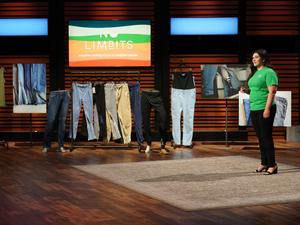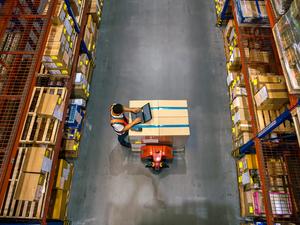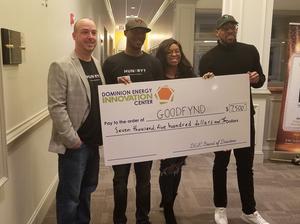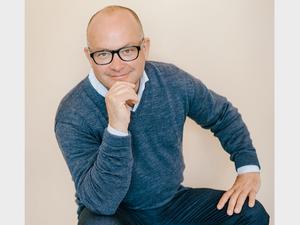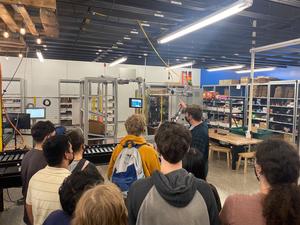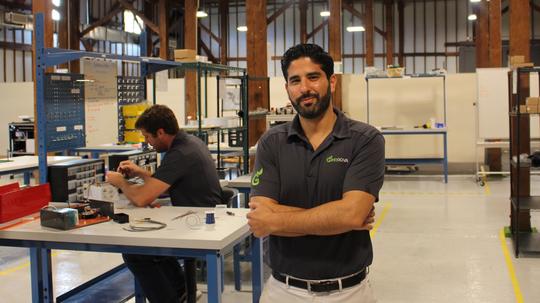
How much of a pipette has to be reused to majorly cut down on plastic lab waste? Turns out, just the tip.
That’s what Ali Safavi, founder of green tech startup Grenova, discovered when he entered the field of biological engineering as a young professional.
Plastic was everywhere. As the genetics, pharmaceutical, medical and agribusiness industries expanded, labs proliferated. In every one of these labs, scientists drew dozens to hundreds of samples, carrying each one in a pipette with a disposable plastic tip. As soon as the sample was deposited at its destination, the tip was discarded.
“No one was paying attention to it,” said Safavi, who calls the pipette "the spoon of the industry." But taken together, all of those plastic tips represented a formidable stockpile of trash — much of it medical or biohazard waste requiring special disposal.
Labs hadn’t always relied so heavily on plastics. For decades, scientists had stocked their workspaces with glass instruments that were dutifully washed and sterilized between tests.
As plastics developed in the mid-20th century, however, labs and businesses embraced them as a cheaper and quicker alternative. An increasing reliance on automation in lab testing deepened the attachment to plastic, which broke less easily than glass and was more tolerant of being gripped and transported by robots.
As lab-based industries grew, that footprint began to mount.
“You’re looking at millions and millions of samples, and each sample uses multiple pipette tips,” said Safavi. “The model that the labs were practicing, it was not sustainable.”
The answer he came up with was deceptively simple: reuse.
Grenova’s first major innovation, the TipNovus, was designed as an easy way for labs to wash and sterilize their plastic pipette tips for reuse instead of discarding them. With an appearance similar to a small refrigerator, the TipNovus can process up to 384 pipette tips in 10 minutes.

“I was trying to minimize the amount of changes the labs would have to do … because I knew I was going against this culture” of disposal, Safavi said. The easier it was for labs to incorporate the TipNovus into their workflow, he reasoned, the more likely they would be to adopt it.
His primary driver may have been environmental, but what caused businesses to take notice was two other advantages the technology offered. The first was cost savings — Safavi says that users of the TipNovus see 90 percent cost reductions in their spending on pipette tips.
The second advantage was more unexpected. One concern was that washing and reusing tips could impact the integrity of samples being tested. Studies showed that was not the case: One, reported by the National Institutes of Health earlier this year, found that data from washed tips “is of the same quality as data generated using fresh sterile tips directly from the manufacturer.”
For some labs, the results were even better, with many reporting to Grenova that when they began washing and reusing their pipette tips, the quality of their test results improved. Safavi said that is due to a reduction of trace resins left on pipette tips during the manufacturing process.
He drew a comparison with a plastic cup bought in a grocery store: most people, he said, would automatically wash the cup before using it to get rid of any lingering substances it might have from the factory: “Why wouldn’t you do that with medical testing?”
“We don’t want to dilute our focus on so many products and possibly jeopardize our quality.”
Grenova claims its products are responsible for reusing more than 78 million pipette tips and have prevented 225,000 pounds of plastic waste from being landfilled.
Since Safavi first had the idea for the TipNovus in 2010, the company, which was founded in May 2014, has grown by leaps and bounds.
Early efforts were funded by seed money from Richmond's now-defunct Health Diagnostic Laboratory, and the product lines soon expanded to include the TipNovusMini, a smaller version of the original, and the TipLumis, a combined storage-and-washing "workflow solution." To date, Grenova holds seven patents for its technologies, with a handful of other applications pending.
Many labs have been reluctant to promote their usage of the TipNovus for competitive reasons, Safavi said, but Grenova’s products have been validated by the NIH and the Centers for Disease Control and Prevention.
“I wish I could recognize them,” he said. “Those early adopters — they took a risk. They believed in us.”
Earlier this year, Grenova relocated its 10 employees from its former home in Midlothian into a 10,000-square-foot space at the Clopton Siteworks in South Richmond, which Safavi describes as resembling “the early stages of Scott’s Addition.”
This year, Grenova’s focus is on scalability, Safavi said — expanding the reach of the company’s products and services without losing sight of its original vision.
“We don’t want to dilute our focus on so many products and possibly jeopardize our quality,” he said. “I want to make sure we can achieve our goal.”
For Safavi, that goal remains cutting down plastic waste. While pipettes are Grenova’s current preoccupation, he’s aware that they are only the tip of the iceberg: plastic test tubes, troughs, plates and other lab equipment are all good candidates for future targets of the company’s reuse mission.
“We’ve barely touched a portion of the main pie,” he said.
